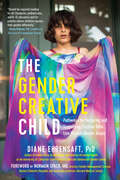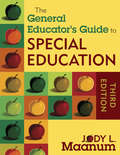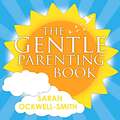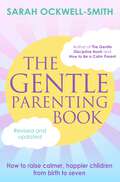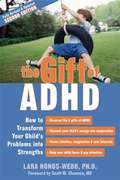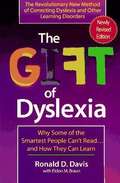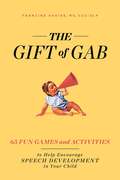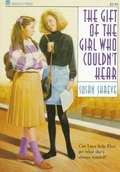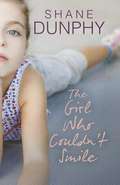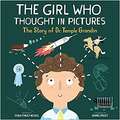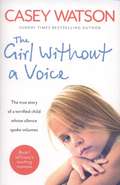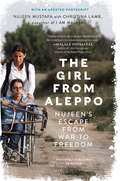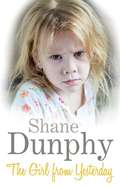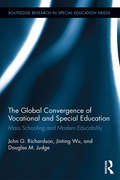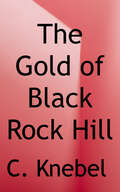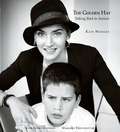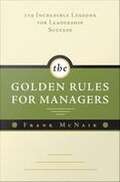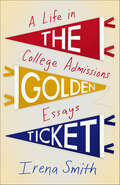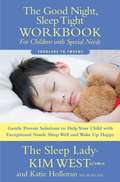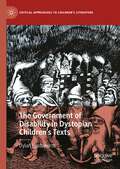- Table View
- List View
The Gender Creative Child: Pathways For Nurturing And Supporting Children Who Live Outside Gender Boxes
by Diane EhrensaftFrom a leading US authority on a subject more timely than ever—an up-to-date, all-in-one resource on gender-nonconforming children and adolescents In her groundbreaking first book, Gender Born, Gender Made, Dr. Diane Ehrensaft coined the term gender creative to describe children whose unique gender expression or sense of identity is not defined by a checkbox on their birth certificate. Now, with The Gender Creative Child, she returns to guide parents and professionals through the rapidly changing cultural, medical, and legal landscape of gender and identity. In this up-to-date, comprehensive resource, Dr. Ehrensaft explains the interconnected effects of biology, nurture, and culture to explore why gender can be fluid, rather than binary. As an advocate for the gender affirmative model and with the expertise she has gained over three decades of pioneering work with children and families, she encourages caregivers to listen to each child, learn their particular needs, and support their quest for a true gender self. The Gender Creative Child unlocks the door to a gender-expansive world, revealing pathways for positive change in our schools, our communities, and the world.
The General Educator's Guide to Special Education
by Jody L. MaanumThe essential guide for teaching effectively in the inclusive classroom! The third edition of this handbook offers easy-to-implement ideas, recommendations, and answers to questions to help general education teachers provide top-notch support for all students. In addition to an all-new section that outlines the basics of the RTI model and intervention strategies, this resource covers: 13 categories recognized under IDEA 2004 for which students may be eligible to receive special education services A step-by-step explanation of the special education process Accommodations and modifications to help students access the general education curriculum The transition process for students with special needs
The Gentle Parenting Book: How to raise calmer, happier children from birth to seven (Gentle #3)
by Sarah Ockwell-SmithParenting trends come and go. Gentle parenting is different - it isn't a label for a precise set of rules but a method of parenting that embraces the needs of parent and child, while being mindful of current science and child psychology. It means parenting with empathy, respect, understanding - and boundaries.In The Gentle Parenting Book, Sarah Ockwell-Smith provides a trustworthy combination of what-to-expect information and gentle-parenting solutions to the most common challenges faced by parents with young children. Sarah addresses a wide variety of topics, including coping with a crying baby, introducing solid foods and creating healthy eating habits, potty training, starting nursery and school, sibling rivalry, tantrums, whining and sulking, aggressive behaviour and much more.And for those parents who have previously used a more authoritarian style of parenting, there's plenty of advice - and reassurance - on making the transition to a gentler approach. For many, gentle parenting comes as a relief because it chimes with their deepest instincts about the best way to raise their children.
The Gentle Parenting Book: How to raise calmer, happier children from birth to seven (Gentle #3)
by Sarah Ockwell-SmithParenting trends come and go. Gentle parenting is different - it isn't a label for a precise set of rules but a method of parenting that embraces the needs of parent and child, while being mindful of current science and child psychology. It means parenting with empathy, respect, understanding - and boundaries.In The Gentle Parenting Book, Sarah Ockwell-Smith provides a trustworthy combination of what-to-expect information and gentle-parenting solutions to the most common challenges faced by parents with young children. Sarah addresses a wide variety of topics, including coping with a crying baby, introducing solid foods and creating healthy eating habits, potty training, starting nursery and school, sibling rivalry, tantrums, whining and sulking, aggressive behaviour and much more.And for those parents who have previously used a more authoritarian style of parenting, there's plenty of advice - and reassurance - on making the transition to a gentler approach. For many, gentle parenting comes as a relief because it chimes with their deepest instincts about the best way to raise their children.
The Gentle Parenting Book: How to raise calmer, happier children from birth to seven (Gentle #3)
by Sarah Ockwell-SmithParenting trends come and go. Gentle parenting is different - it isn't a label for a precise set of rules but a method of parenting that embraces the needs of parent and child, while being mindful of current science and child psychology. It means parenting with empathy, respect, understanding - and boundaries.In The Gentle Parenting Book, Sarah Ockwell-Smith provides a trustworthy combination of what-to-expect information and gentle-parenting solutions to the most common challenges faced by parents with young children. Sarah addresses a wide variety of topics, including coping with a crying baby, introducing solid foods and creating healthy eating habits, potty training, starting nursery and school, sibling rivalry, tantrums, whining and sulking, aggressive behaviour and much more.And for those parents who have previously used a more authoritarian style of parenting, there's plenty of advice - and reassurance - on making the transition to a gentler approach. For many, gentle parenting comes as a relief because it chimes with their deepest instincts about the best way to raise their children.
The Ghost Child Ballet: A Poetry Collection
by Misty BurkeIn the tradition of the confessional poets, Misty Burke's newest poetry collection is a heartfelt and emotional look at raising an autistic child. It takes the reader from the difficulties of a premature delivery to parenting an adult with autism. The Ghost Child Ballet is written in a conversational, narrative tone that uses everyday events to explore some of the bigger issues within the special needs community.
The Gift of ADHD: How to Transform Your Child's Problems into Strengths (Second Edition)
by Lara Honos-WebbThis second edition of The Gift of ADHD includes compelling new research indicating that the impulses that lead your child to act exuberantly may correspond with unusual levels of creativity and a heightened capacity for insight into the feelings and emotions of others. <P><P>Lara Honos-Webb presents the evidence for this revolutionary concept and explains how you can help your child develop control over inattentive, hyperactive behavior and enhance the five gifts of ADHD: creativity, attunement to nature, interpersonal intuition, energetic enthusiasm, and emotional sensitivity. <P><P>Filled with easy skill-building activities you and your child can do together, this book will help your child transform problematic symptoms into strengths, then build the self-esteem they need to let those gifts shine.
The Gift of Dyslexia: Why Some of the Smartest People Can't Read and How They Can Learn
by Ronald D. Davis Eldon M. BraunDavis shares the startling discovery he made which helped him overcome his own dyslexia, and reveals how dyslexia may be linked to uncommonly high levels of intelligence, creativity, and imagination.
The Gift of Gab: 65 Fun Games and Activities to Help Encourage Speech Development in Your Child
by Francine DavidsEncourage speech development with fun games and activities from veteran speech pathologist Francine Davids. From babbling babies to young elementary schoolers, this fun, engaging collection of educational games and activities can jump-start language development at any stage. Whether your child has a developmental delay or you just want to set them up for success, The Gift of Gab provides all the tools you need to practice language in a low-pressure way. With the calm reassurance of a lifelong educator, author Francine Davids also offers background on the basics of language development, a range of milestones, and some easy ways to tell if your child is on the right track. Organized by game type, so parents can easily find the most age-appropriate material, The Gift of Gab covers a range of fun approaches, including: -Singing and clapping games -Games that use toys you already have in the house -Games using homemade materials like cootie catchers and paper dice -Imaginative card games -Games to play on the go, in the car, or at the grocery store -Games for larger groups -And even games to teach social skills like taking turns! With a range of printable materials available online for free download, The Gift of Gab not only takes the stress out of language development, it also offers an accessible, play-based way to connect with your child every day.
The Gift of Healing: A Personal Story of Spiritual Therapy
by Ambrose A. Worrall Olga N. Worrall"This is an excellent, thrilling, and highly representative record of the life and ministry of a most lovable, amazing, authentic and committed couple. It is a joy to anticipate that through this book many persons will share the inspiration and strength and faith that accompanies acquaintance with Ambrose and Olga Worrall. I doubt if anyone can adequately estimate the faith which this testimony to the healing power in God's world may have upon many lives."-ROBERT M. COX, Executive Director, The Laymen's Movement
The Gift of the Girl Who Couldn't Hear
by Susan Richards ShreveLife can seem awfully confusing for a young girl turning 13. Suddenly the things young Eliza wants most, like a role in the school musical, seem hopelessly out of reach. Then Eliza starts teaching her friend Lucy--who has been deaf since birth--to sing, and her confusion begins to dissolve.
The Gifts of the Body
by Rebecca BrownA woman volunteer who cares for people with AIDS narrates a poignant account of the clients she comes to love in her role as a home-care aide, in a bittersweet novel about life, illness, death, and remembrance. By the author of The Children's Crusade.
The Girl Who Could Fly
by Victoria ForesterYou just can't keep a good girl down . . . unless you use the proper methods. Piper McCloud can fly. Just like that. Easy as pie. Sure, she hasn't mastered reverse propulsion and her turns are kind of sloppy, but she's real good at loop-the-loops. Problem is, the good folk of Lowland County are afraid of Piper. And her ma's at her wit's end. So it seems only fitting that she leave her parents' farm to attend a top-secret, maximum-security school for kids with exceptional abilities. School is great at first with a bunch of new friends whose skills range from super-strength to super-genius. (Plus all the homemade apple pie she can eat!) But Piper is special, even among the special. And there are consequences. Consequences too dire to talk about. Too crazy to consider. And too dangerous to ignore. At turns exhilarating and terrifying, Victoria Forester's debut novel has been praised by Stephenie Meyer, author of the Twilight saga, as "the oddest/sweetest mix of Little House on the Prairie and X-Men. . . Prepare to have your heart warmed. " The Girl Who Could Fly is an unforgettable story of defiance and courage about an irrepressible heroine who can, who will, who must . . . fly. Praise for Victoria Forester and The Girl Who Could Fly: "It's the oddest/sweetest mix of Little House on the Prairie and X-Men. I was smiling the whole time (except for the part where I cried). I gave it to my mom, and I'm reading it to my kids--it's absolutely multigenerational. Prepare to have your heart warmed. " Stephenie Meyer, author of the Twilight saga "In this terrific debut novel, readers meet Piper McCloud, the late-in-life daughter of farmers. . . The story soars, just like Piper, with enough loop-de-loops to keep kids uncertain about what will come next. . . . Best of all are the book's strong, lightly wrapped messages about friendship and authenticity and the difference between doing well and doing good. "--Booklist, Starred Review "Forester's disparate settings (down-home farm and futuristic ice-bunker institute) are unified by the rock-solid point of view and unpretentious diction... any child who has felt different will take strength from Piper's fight to be herself against the tide of family, church, and society.
The Girl Who Couldn't Smile
by Shane DunphyStarting work at Little Scamps creche, child protection worker Shane Dunphy faces the difficulty of communicating and befriending some of the other diverse and challenging children - as well as uncovering the secret of a girl who couldn't smile.
The Girl Who Thought In Pictures The Story of Dr. Temple Grandin
by Julia Finley MoscaWhen young Temple was diagnosed with autism, no one expected her to talk, let alone become one of the most powerful voices in modern science. Yet, the determined visual thinker did just that. Her unique mind allowed her to connect with animals in a special way, helping her invent groundbreaking improvements for farms around the globe!
The Girl Without a Voice
by Casey WatsonCasey has been in the post for six months when thirteen-year-old Imogen joins her class. One of six children Casey is teaching, Imogen has selective mutism. She's a bright girl, but her speech problems have been making mainstream lessons difficult. Life at home is also hard for Imogen. Her mum walked out on her a few years earlier and she's never got along with her dad's new girlfriend. She's now living with her grandparents. There's no physical explanation for Imogen's condition, and her family insist she's never had troubles like this before. Everyone thinks Imogen is just playing up - except the member of staff closest to her, her teacher Casey Watson. It is the deadpan expression she constantly has on her face that is most disturbing to Casey. Determined there must be more to it, Casey starts digging and it's not long before she starts to discover a very different side to Imogen's character. A visit to her grandparents' reveals that Imogen is anything but silent at home. In fact she's prone to violent outbursts; her elderly grandparents are terrified of her. Eventually Casey's hard work starts to pay off. After months of silence, Imogen utters her first, terrified, words to Casey: -I thought she was going to burn me. ' Dark, shocking and deeply disturbing, Casey begins to uncover the reality of what Imogen has been subjected to for years.
The Girl from Aleppo: Nujeen's Escape from War to Freedom
by Christina Lamb Nujeen MustafaPrize-winning journalist and the co-author of smash New York Times bestseller I Am Malala, Christina Lamb, now tells the inspiring true story of another remarkable young hero: Nujeen Mustafa, a teenager born with cerebral palsy, whose harrowing journey from war-ravaged Syria to Germany in a wheelchair is a breathtaking tale of fortitude, grit, and hope that lends a face to the greatest humanitarian issue of our time, the Syrian refugee crisis.For millions around the globe, sixteen-year-old Nujeen Mustafa embodies the best of the human spirit. Confined to a wheelchair because of her cerebral palsy and denied formal schooling in Syria because of her illness, Nujeen taught herself English by watching American soap operas. When her small town became the epicenter of the brutal fight between ISIS militants and US-backed Kurdish troops in 2014, she and her family were forced to flee.Despite her physical limitations, Nujeen embarked on the arduous trek to safety and a new life. The grueling sixteen-month odyssey by foot, boat, and bus took her across Turkey and the Mediterranean to Greece, through Macedonia to Serbia and Hungary, and finally, to Germany. Yet, in spite of the tremendous physical hardship she endured, Nujeen's extraordinary optimism never wavered. Refusing to give in to despair or see herself as a passive victim, she kept her head high. As she told a BBC reporter, "You should fight to get what you want in this world."Nujeen's positivity and resolve infuses this unforgettable story of one young woman determined to make a better life for herself. Told by acclaimed British foreign correspondent Christina Lamb, Nujeen is a unique and powerful memoir that gives voice to the Syrian refugee crisis, helping us to understand that the world must change—and offering the inspiration to make that change reality.
The Girl from Yesterday
by Shane DunphyWhen a part time journalism job in rural Ireland leads Shane Dunphy to a family in desperate need of intervention, and a young girl crying out for protection, Shane cannot stand idly by and watch...
The Global Convergence Of Vocational and Special Education: Mass Schooling and Modern Educability (Routledge Research in Special Educational Needs)
by John G. Richardson Jinting Wu Douglas M. JudgeThe global trend in educational participation has brought with it a cross-national consequence: the expansion of students with "special needs" (SEN) placed in special education and the growth of "low achieving" students diverted to vocational tracks. This book explores the global expansion of special and vocational education as a highly variable event, not only across nations of considerable economic, political and cultural difference, but between nations with evident similarities as well. The Global Convergence of Vocational and Special Education analyzes how the concept of secular benevolence underscores the divergent and convergent trajectories that vocational and special education have taken across the globe. The authors embrace national differences as the means to observe two dicta of comparative research: similar origins can result in very different outcomes, and similar outcomes can be the result of very different origins.
The Gold of Black Rock Hill (Decodable Chapter Books for Kids With Dyslexia)
by C. KnebelWith a long lost map, Big Dan and his ship hands are off on their biggest quest of all: to get the gold of Black Rock Hill. But odd things are happening on the ship. And ship cat Dex spots that two bad ship hands are plotting a scam to get the gold. Can Dex and his new pal Mist stop the scam?
The Golden Hat
by Keli Thorsteinsson Kate Winslet Margret EricsdottirThank you for taking this journey with us. We hope this book brings a new awareness of the opportunity we have to help those with autism learn to communicate and realize their ambitions. People with autism have the potential to achieve great things, but only when given the appropriate support and education. This is why the Golden Hat Foundation was formed. All author proceeds from this book go directly to the Golden Hat Foundation. With your help, we can change the world for people with autism. For more information about the Golden Hat Foundation and ways you can help, please visit our website: www.goldenhatfoundation.org "I simply couldn't conceive of how devastating it would be not to be able to hear my children's voices. Not to be able to communicate with them, to hear them learn, grow, and express themselves verbally. How fortunate, how blessed I am. This overwhelmed me. I can talk to my children, I can respond to their needs and comfort them when they tell me they are unwell. I can tell them stories and hear them tell theirs." Kate Winslet Imagine what it would be like not to be able to communicate with those we love. For many individuals living with nonverbal autism and their families, this is their everyday reality. The Golden Hat is an intimate response to this reality created by Kate Winslet, Margret Ericsdottir, and her son Keli, who has nonverbal autism. Kate and Margret's stories, their personal email correspondence, and Keli's poetry give us a profound insight into the world of those living with autism. Kate has shared this story with some of the world's most famous people, posing the question: "What is important to you to express?" Their responses are a collection of intimate self-portraits and unique quotes. Among them are: Christina Aguilera Zac Efron Julianne Moore Maria Sharapova Kobe Bryant James Franco Rosie O'Donnell Ben Stiller Michael Caine Ricky Gervais Michael Phelps Meryl Streep Kim Cattrall Tom Hanks John C. Reilly Justin Timberlake George Clooney Elton John Tim Robbins Naomi Watts Leonardo DiCaprio Jude Law Kristin Scott Thomas Oprah Winfrey Put together by Kate, Margret, and the dedicated team who work daily on the Golden Hat Foundation, this project has been a labor of love. All the author proceeds from this groundbreaking book will benefit the Golden Hat Foundation, founded by Kate Winslet and Margret Ericsdottir to build innovative living campuses for people with autism and raise public awareness of their intellectual capabilities.
The Golden Rules For Managers
by Frank McnairOften, the advice that makes the most impact does so because it's delivered in a clear, memorable saying that cuts to the heart of the issue. For business readers fed up with long books that say little, nothing could be more refreshing than The Golden Rules for Managers. Management expert Frank McNair distills the best business wisdom into 119 memorable nuggets that speak directly to management issues, then explains the lessons behind the each saying. * Paint a Clear Picture of the Target (goal setting) * What you Reward is What You Get (providing employee feedback) * Employees will Respect what you Expect if you Inspect (follow-up) * A Plan Is Not a Straightjacket (flexibility in execution) * The Madder You Get, the Dumber You Are (self-management) Packaged for visual impact and easy reading, The Golden Rules for Managers is the new golden standard in management guides.
The Golden Ticket: A Life in College Admissions Essays
by Irena SmithWhat do we, as parents, really mean when we say we want the best for our children?Irena Smith tackles this question from a unique vantage point: as a former Stanford admissions officer, a private Palo Alto college counselor, and a mother of three children who struggle to find their place in the long shadow of Stanford University.Written as a series of responses to actual college essay prompts, this witty, raw memoir takes the reader from the smoke-filled lobby of the Hebrew Aid Society in Rome, where Irena and her parents await asylum with other Soviet refugees in 1977, to the overpriced house she and her husband buy in Palo Alto in 1999, to the hushed inner sanctum of the Stanford admissions office. Irena grows a successful college counseling practice but struggles to reconcile the lofty aspirations of tightly wound, competitive high school seniors (and their anxious parents) with her own attempts to keep her family from unraveling as, one by one, her children are diagnosed with autism, learning differences, depression, and anxiety. And although she doesn’t initially understand her children—or how to help them—she will not stop stumbling and learning until she figures it out. The Golden Ticket opens a much-needed conversation about extreme parenting, the weight of generational expectations, and what happens when Gen-X dreams meet unexpected realities. It's a sharp-eyed depiction of hard-won triumphs and of the messy, challenging parts of parenting you won't see on Facebook or Instagram. Above all, it's an invitation to embrace a broader, more generous definition of success.
The Good Night Sleep Tight Workbook for Children Special Needs: Gentle Proven Solutions to Help Your Child with Exceptional Needs Sleep Well
by Kim West Katie HolloranWith its easy-to-use and clear step-by-step format, the Good Night, Sleep Tight Workbook will help tired parents create and follow an effective sleep plan to achieve sleep success for their kids with special needs—toddlers to tweens. With its easy-to-use and clear step-by-step format, the Good Night, Sleep Tight Workbook will help tired parents create and follow an effective sleep plan to achieve sleep success for their kids with special needs—toddlers to tweens.
The Government of Disability in Dystopian Children’s Texts (Critical Approaches to Children's Literature)
by Dylan HoldsworthThis book takes up the task of mapping discursive shifts in the representation of disability in dystopian youth texts across four historical periods where major social, cultural and political shifts were occurring in the lives of many disabled people. By focusing on dystopian texts, which the author argues act as sites for challenging or reinforcing dominant belief systems and ways of being, this study explores the potential of literature, film and television to act as a catalyst of change in the representation of disability. In addition, this work discusses the texts and technologies that continue to perpetuate questionable and often competing discourses on the subject.
